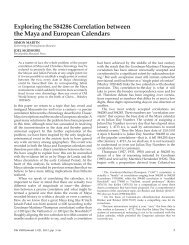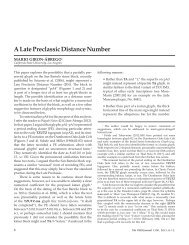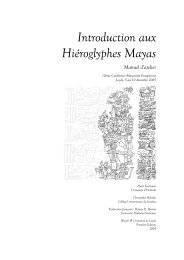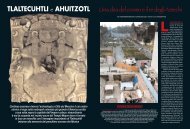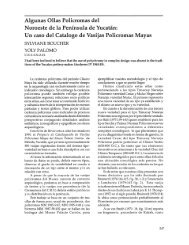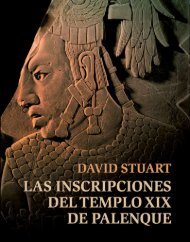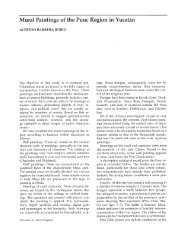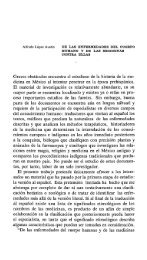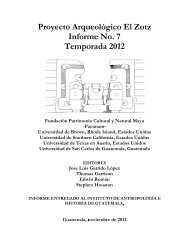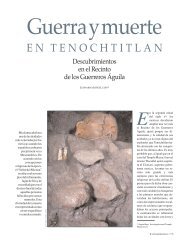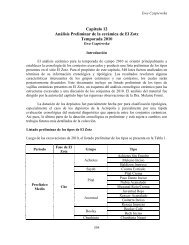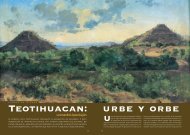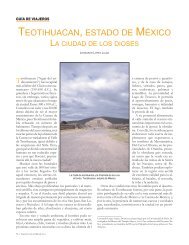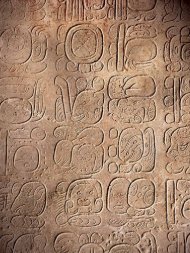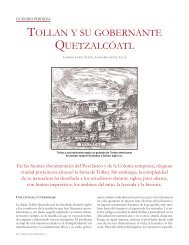Popol Vuh: Sacred Book of the Quiché Maya - Mesoweb
Popol Vuh: Sacred Book of the Quiché Maya - Mesoweb
Popol Vuh: Sacred Book of the Quiché Maya - Mesoweb
Create successful ePaper yourself
Turn your PDF publications into a flip-book with our unique Google optimized e-Paper software.
Spanish Crown. In his first letter to Cortés, Alvarado described Guatemala as “<strong>the</strong> wildest<br />
land and people that has ever been seen.... We are so far from help that if Our Lady does not<br />
aid us, no one can” (Alvarado 1979, 105). Following a brief, yet bloody campaign, Alvarado<br />
entered <strong>the</strong> <strong>Quiché</strong> capital at Cumarcah (also known by its Nahua name, Utatlan) without<br />
resistance on March 7, 1524, at <strong>the</strong> invitation <strong>of</strong> <strong>the</strong> lords Oxib Quieh and Beleheb Tzi. Once<br />
inside <strong>the</strong> city, Alvarado suspected a trap and ordered <strong>the</strong> arrest and execution <strong>of</strong> its rulers:<br />
As I knew <strong>the</strong>m [<strong>the</strong> <strong>Quiché</strong> lords] to have such ill will toward <strong>the</strong> service<br />
<strong>of</strong> His Majesty, and for <strong>the</strong> good and tranquility <strong>of</strong> <strong>the</strong> land, I burned <strong>the</strong>m, and I<br />
commanded to be burned <strong>the</strong> town <strong>of</strong> Utatlan to its foundations, for it was<br />
dangerous and strong.... All <strong>the</strong>y that were taken prisoners <strong>of</strong> war were branded<br />
and made slaves. (Alvarado 1979, 102-3)<br />
During <strong>the</strong> early Spanish Colonial period, <strong>the</strong> population <strong>of</strong> Guatemala declined by as<br />
much as 85% as a result <strong>of</strong> war, forced labor, and disease. Fortunately, President Alonso<br />
López Cerrato, <strong>the</strong> successor to Pedro de Alvarado, was more tolerant:<br />
During this year [1549] <strong>the</strong> Lord President Cerrado arrived.... When he<br />
arrived, he condemned <strong>the</strong> Spaniards, he liberated <strong>the</strong> slaves and vassals <strong>of</strong> <strong>the</strong><br />
Spaniards, he cut <strong>the</strong> taxes in two, he suspended forced labor and made <strong>the</strong><br />
Spaniards pay all men, great and small. The lord Cerrado truly alleviated <strong>the</strong><br />
sufferings <strong>of</strong> <strong>the</strong> people. I myself saw him, oh, my sons! (Recinos and Goetz<br />
1953, 137)<br />
Christianity was formally established in Guatemala in 1534 under Bishop Francisco<br />
Marroquín, who sent out priests with portable altars to <strong>the</strong> various Indian towns and villages<br />
to baptize <strong>the</strong> <strong>Maya</strong> and destroy any remnants <strong>of</strong> “idolatry” and “paganism” which might<br />
have survived <strong>the</strong> Conquest. To aid in <strong>the</strong> process <strong>of</strong> conversion, missionary priests ga<strong>the</strong>red<br />
<strong>the</strong> <strong>Maya</strong> into towns, each with a church to administer Catholic rites and instruct <strong>the</strong>m in <strong>the</strong><br />
Christian faith. Because Cumarcah had been all but destroyed during <strong>the</strong> war, <strong>the</strong> remnants <strong>of</strong><br />
its population were moved to a new settlement nearby in ca. 1555, which <strong>the</strong> Spanish<br />
authorities called Santa Cruz del <strong>Quiché</strong> (Holy Cross <strong>of</strong> <strong>the</strong> <strong>Quiché</strong>). It was likely here that<br />
<strong>the</strong> <strong>Popol</strong> <strong>Vuh</strong> was compiled in <strong>the</strong> form that we have today.<br />
22



